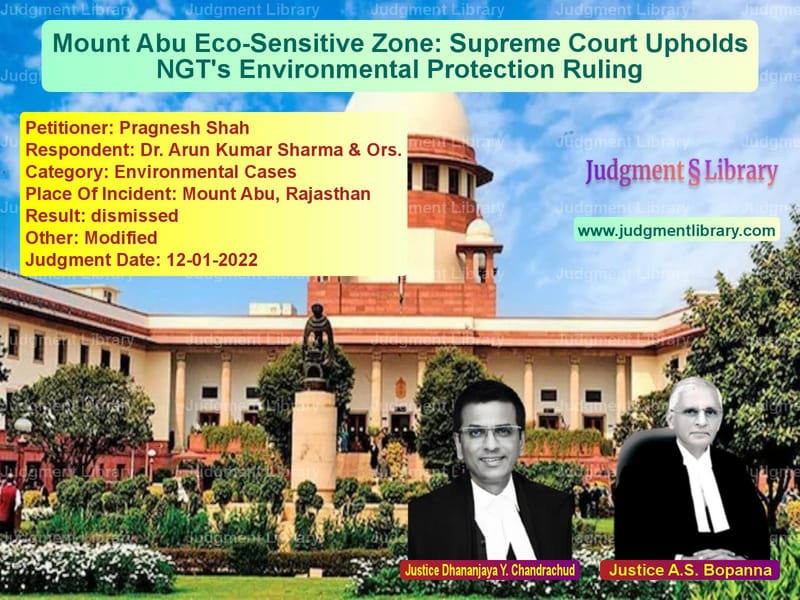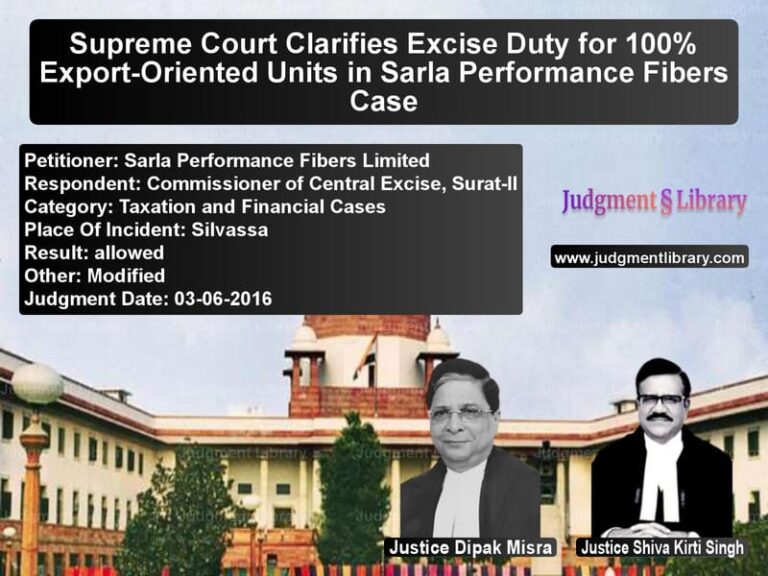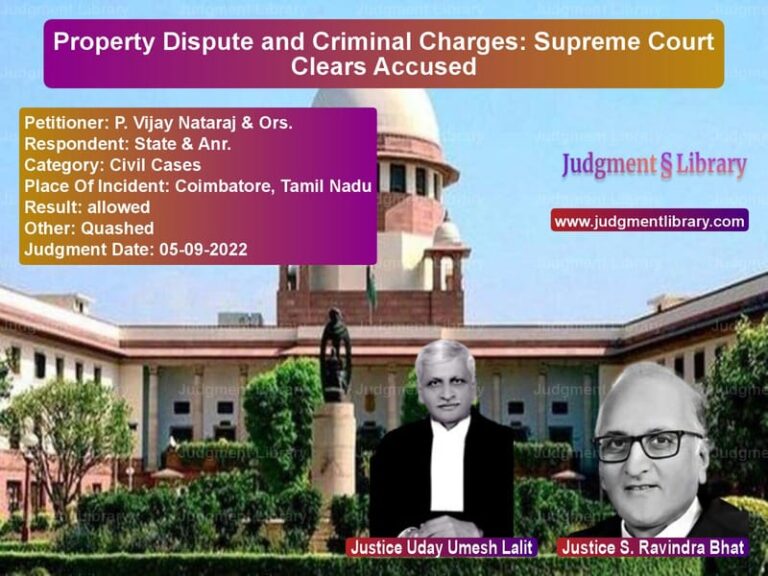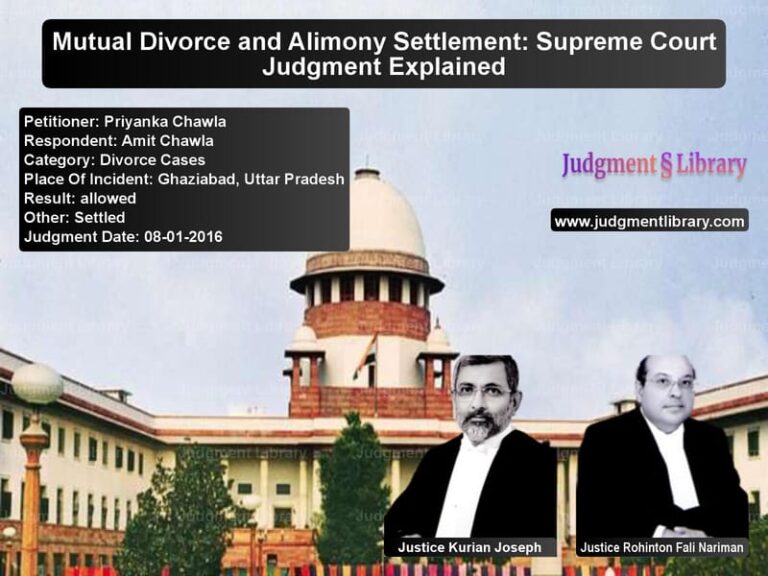Mount Abu Eco-Sensitive Zone: Supreme Court Upholds NGT’s Environmental Protection Ruling
The case of Pragnesh Shah vs. Dr. Arun Kumar Sharma & Ors. pertains to a dispute over land use in the Mount Abu Eco-Sensitive Zone (ESZ) in Rajasthan. The Supreme Court examined whether the National Green Tribunal (NGT) was correct in directing modifications to the Zonal Master Plan 2030 (ZMP 2030) to ensure compliance with environmental regulations. The Court upheld the NGT’s ruling, emphasizing the importance of protecting ecologically sensitive areas.
Background of the Case
The appellant, Pragnesh Shah, owned a parcel of land in Mount Abu. The land was initially classified as Residential and Tourist Facility under the previous Zonal Master Plan 2025. However, when the new ZMP 2030 was prepared, the classification of the land changed, restricting construction.
The changes were made in accordance with the Eco-Sensitive Zone Notification (ESZ Notification) issued by the Ministry of Environment, Forest and Climate Change (MoEF&CC) on June 25, 2009. The ESZ Notification declared Mount Abu and its surroundings as an eco-sensitive zone, requiring strict environmental controls on developmental activities.
The dispute began when an environmental activist, Dr. Arun Kumar Sharma, filed a petition before the NGT, challenging ZMP 2030 for allowing construction in certain environmentally sensitive areas. The NGT referred the matter to an Expert Committee, which recommended restrictions on construction, including on the appellant’s land. The appellant then challenged the NGT’s findings before the Supreme Court.
Petitioner’s Arguments
The appellant, represented by Mukul Rohatgi, contended:
- The NGT had exceeded its jurisdiction by directing amendments to ZMP 2030.
- The land was originally classified as Residential and Tourist Facility under ZMP 2025 and was wrongly reclassified in ZMP 2030.
- The Expert Committee’s findings were based on flawed methodology and selective enforcement.
- Other similarly situated properties were permitted construction, while his land was unfairly restricted.
- The ESZ Notification should not have retroactive effects on existing land classifications.
Respondent’s Arguments
The respondents, represented by Amit Sibal, countered:
- Mount Abu is an environmentally fragile area requiring strict protection.
- The Expert Committee followed a rigorous scientific methodology in its assessment.
- The NGT acted well within its jurisdiction under the National Green Tribunal Act, 2010, which empowers it to enforce environmental laws.
- The precautionary principle mandates that environmental protection takes precedence over private property rights.
- The appellant’s land is part of a critical wildlife corridor, and construction would harm the habitat of protected species like the sloth bear.
Key Observations of the Supreme Court
A bench comprising Justice Dhananjaya Y. Chandrachud and Justice A.S. Bopanna made the following key observations:
- The NGT had acted within its jurisdiction in assessing the ZMP 2030’s compliance with the ESZ Notification.
- The precautionary principle requires that ecologically sensitive areas be protected even if complete scientific certainty is lacking.
- The Expert Committee’s findings were based on scientific data, satellite imagery, and field studies, making them reliable.
- Environmental protection is a constitutional mandate under Article 21 (Right to Life) and Article 48A (Protection of Environment).
- The appellant’s claim of discrimination was unfounded, as other properties had different ecological characteristics.
Final Judgment
The Supreme Court ruled:
- The NGT’s decision was upheld, and the appellant’s land remained classified as environmentally restricted.
- The ZMP 2030 had to be modified to comply with the ESZ Notification.
- Construction on the appellant’s land was prohibited to protect the wildlife ecosystem.
- The precautionary principle must be strictly applied in eco-sensitive zones.
Implications of the Judgment
The ruling has significant legal and environmental implications:
- Stronger Protection for Eco-Sensitive Zones: The judgment reinforces the need to regulate development in environmentally fragile areas.
- NGT’s Expanding Role: The decision affirms the NGT’s power to intervene in environmental matters beyond simple dispute resolution.
- Precautionary Principle as a Guiding Factor: Courts must favor environmental conservation over economic interests when scientific uncertainty exists.
- Precedent for Future Land Use Cases: The ruling sets a precedent for other property disputes in protected areas.
Conclusion
The case of Pragnesh Shah vs. Dr. Arun Kumar Sharma underscores the judiciary’s commitment to environmental protection. The Supreme Court’s decision ensures that eco-sensitive zones remain protected from unregulated development, reinforcing the importance of sustainable urban planning and adherence to environmental regulations.
Petitioner Name: Pragnesh Shah.Respondent Name: Dr. Arun Kumar Sharma & Ors..Judgment By: Justice Dhananjaya Y. Chandrachud, Justice A.S. Bopanna.Place Of Incident: Mount Abu, Rajasthan.Judgment Date: 12-01-2022.
Don’t miss out on the full details! Download the complete judgment in PDF format below and gain valuable insights instantly!
Download Judgment: pragnesh-shah-vs-dr.-arun-kumar-sharm-supreme-court-of-india-judgment-dated-12-01-2022.pdf
Directly Download Judgment: Directly download this Judgment
See all petitions in Environmental Cases
See all petitions in Judgment by Dhananjaya Y Chandrachud
See all petitions in Judgment by A. S. Bopanna
See all petitions in dismissed
See all petitions in Modified
See all petitions in supreme court of India judgments January 2022
See all petitions in 2022 judgments
See all posts in Environmental Cases Category
See all allowed petitions in Environmental Cases Category
See all Dismissed petitions in Environmental Cases Category
See all partially allowed petitions in Environmental Cases Category







